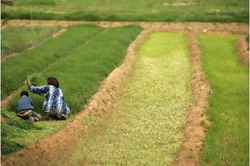The National | 2 February 2011
by Megan Detrie
AMMAN, JORDAN // A handful of North African countries, along with Iraq and Sudan, could feed the Gulf - but only with substantial GCC investment, experts said yesterday.
Speakers at the Arab Food Industries and Franchising Forum in Jordan argued that if land in Sudan, Iraq, Libya, Algeria and Morocco were fully used it could support the rest of the region.
The area uses barely a tenth of its available arable land, according to George Nasrawi, who was representing Lebanese businesses. Instead, said Imad Abou Rafeh, the director of AR events, the conference organiser, countries are concentrating on quick returns from tourism and property. That, he said, was not sustainable.
More agriculture would mean more jobs, not only on farms but in processing, advertising and packaging, he added.
A report released last spring by the International Food Policy Reseach Institute, which researches food issues in the developing world, suggested that long-term food supplies could be best secured by arrangements that helped producer countries' economies to grow, raising incomes.
The unemployment rate in the Mena region is one of the highest in the world, especially among young people. The World Bank puts the global average youth unemployment rate at 14 per cent; in the Mena region it is 25 per cent. As much as a fifth of the Mena population lives on less than $2 a day.
Abdullah Sultan al Fa'an Shamsi, an adviser to the UAE Ministry of Economy, said political instability had led investors to overlook North Africa. He also called for tax breaks, deregulation and greater transparency. Countries in the Mena region generally have higher export tariffs on agricultural goods than in most of the developing world. This, experts say, needs to change.
"Arab countries need to have a unified position on agriculture," said Elias Assouad, chief executive of Temco Group, which specialises in food manufacturing and refrigeration. He called for customs barriers to be lifted.
The UAE has already made significant investments in Sudan, holding 2,800 square kilometres of farmland. Between them, GCC countries own 4,800 square kilometres of Sudanese farmland.
"The UAE has taken serious action towards aquiring land and starting its cultivation," said Mr al Fa'an Shamsi.
But companies at the forum remained optimistic. Abdulraouf Manna, the managing director of Savola group, a food manufacturer, said it planned to open agriculture enterprises in the region.
"We don't jump into businesses we don't understand, and so we'd like to find a partner in Sudan or North Africa," he said.
The process is difficult, though. The necessary regulations exist to guide investments, but are not always implemented.
The cost of oil - which accounts for up to half the cost of farming - is also rising again, currently heading towards $100 a barrel. That raises the price of fuel for transport and machinery, and many fertilisers are petroleum-based too.
Andew Barnett, an economist at the American University of Sharjah, said that even if the Gulf benefited from the increased oil revenue, it paid it back in the rising price of food.
"It doesn't matter if they buy farms in Africa or Asia, the cost of producing food will be higher," he said.
[email protected]













